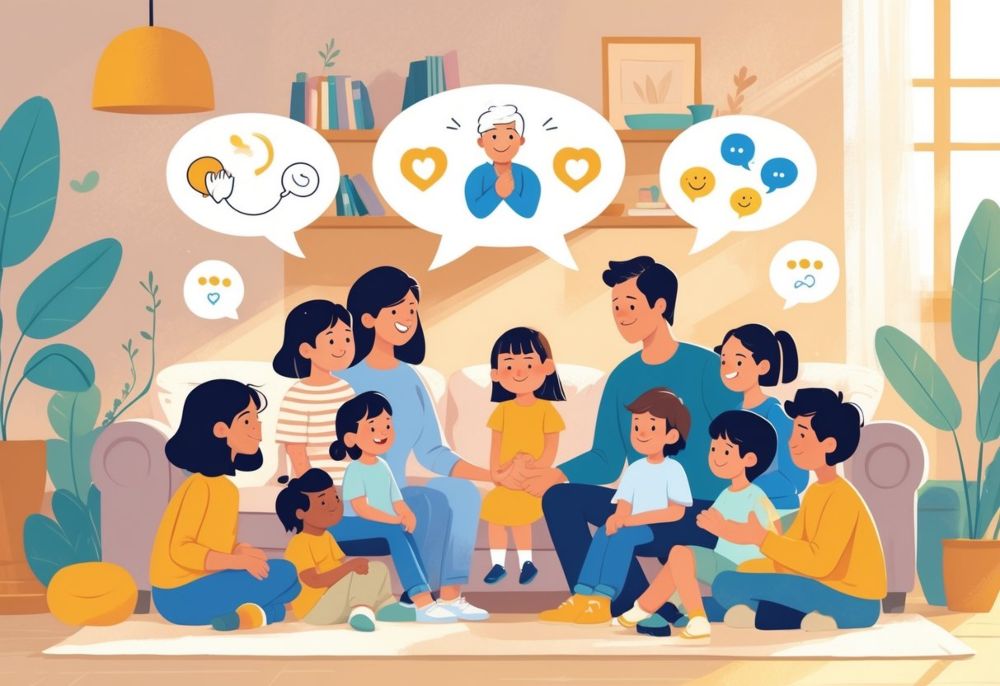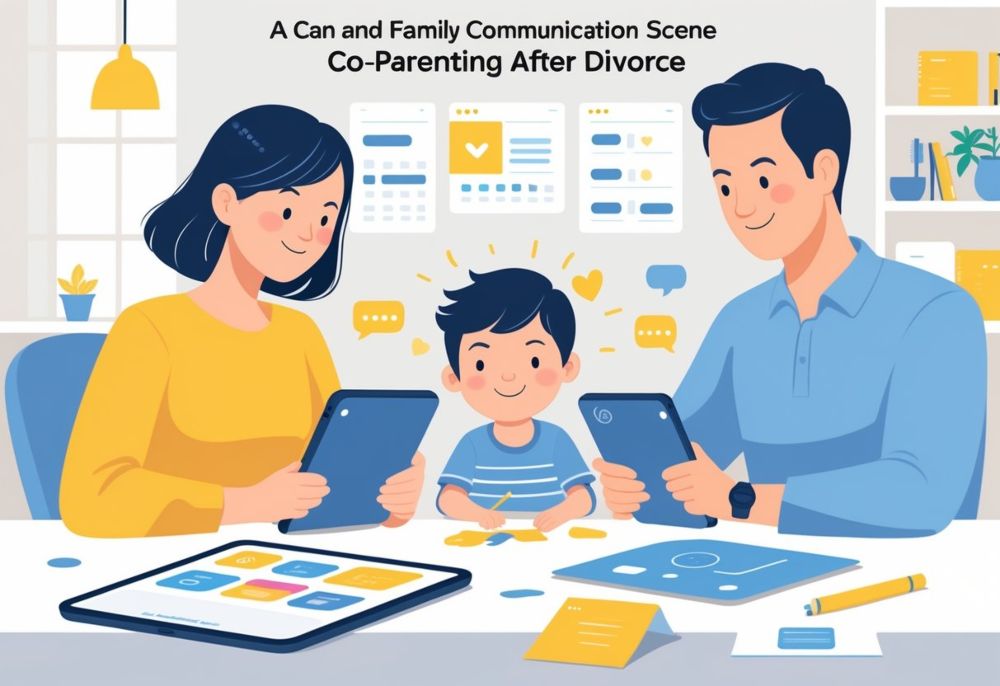7 Communication Techniques That Put Kids First After Divorce
Originally published: May 2025 | Reviewed by Carol Ann Mazza
Divorce shakes up family life, and kids often feel the impact most. Parents must figure out new routines and ways to share parenting from different homes.

Good communication between co-parents helps kids feel safe and supported during these changes.
Clear, respectful conversations let parents collaborate, keep conflict low, and focus on what matters—their children.
Divorce can create emotional and logistical chaos, especially for children caught in the middle. But it doesn’t have to stay that way.
With the right communication strategies, co-parents can create a calmer, more secure environment that prioritizes their child’s needs.
The following evidence-based techniques are designed to help parents reduce conflict, improve collaboration, and support their child’s emotional well-being, no matter how strained the relationship may be.
1) Establish Clear, Consistent Communication Channels Focused on the Child’s Needs.
After divorce, co-parents need simple, regular ways to talk about their child. This keeps everyone on the same page and reduces confusion.
It works best when parents focus their conversations on the child—think school, health, or daily routines. Avoiding unrelated topics helps prevent arguments.
Setting boundaries can make things easier. Maybe you agree to use email, a co-parenting app, or have scheduled phone calls for updates. Some folks swear by messaging tools that support healthy communication after divorce.
Sticking to regular updates in a calm, business-like manner helps a lot. Even when you don’t agree, respect goes a long way.
Leave personal history and old arguments out of it. The main goal is always the child’s well-being, no matter what else is going on.
Carolann Mazza helps families build peaceful, child-focused plans after divorce. Book a consultation to learn how collaborative tools can support your parenting journey—without going to court.
If you’re ready to get started, call us now!
2) Use Parenting Apps to keep all Discussions Organized and Child-Centered.

Apps like OurFamilyWizard help parents keep things about the kids. These apps offer calendars, secure messaging, and tools to track expenses, all in one spot.
They’re built to support clear, respectful conversations. By managing updates in the app, both parents can avoid misunderstandings and stay informed.
Many families find that these apps lower the conflict. Everyone sees the same information, so there’s less room for arguments over what was said or agreed upon.
Using a co-parenting app also sets boundaries. It gives you a neutral space to talk about the kids, keeping personal stuff out of the day-to-day. This helps parents work together while respecting each other’s privacy.
3) Agree On Sharing Detailed Updates about the Child’s Health, School, and Social Activities
Both parents should share updates about their child’s health, schoolwork, and social life. This keeps everyone involved and helps avoid mix-ups.
Setting a regular time each day or week for these updates is smart. Short calls or texts work well for sharing details and help ensure nothing important slips through the cracks.
Let each other know about things like illnesses, doctor visits, grades, and school projects. Mentioning routine changes or social events also helps keep things smooth for the child.
Some parents log these updates using a shared calendar or app. It’s an easy way to stay on top of school meetings, activities, or schedule changes.
Healthy communication takes practice—and the right guidance. Carolann Mazza offers mediation and collaborative divorce services designed to keep the focus on your child’s well-being. Let’s build a better co-parenting plan together.
If you’re ready to get started, call us now!
4) Maintain a Respectful Tone, Avoiding Blame or Adult Conflicts in all Exchanges.
Parents should use calm, respectful words in every conversation about their child. Even if you don’t agree, a neutral tone keeps things from getting heated.
Focus on the child’s needs, not old mistakes. Leaving blame out of your messages helps prevent spiraling.
Kids are always paying attention, even when you think they’re not. When parents avoid fighting or blaming, children feel safer and learn healthy ways to handle conflict.
Use respectful language during pick-ups, drop-offs, and in writing. Research shows that keeping arguments away from kids supports their emotional well-being.
If a disagreement heats up, it’s okay to pause and return to it later. That keeps the focus where it belongs—on your child.
5) Set Boundaries on Communication Timing to Respect Each Other’s Schedules and Reduce Stress.
Deciding when to talk makes co-parenting easier. Agree on times that work, like after work or during certain hours, so no one feels interrupted or rushed.
Knowing you won’t get messages late at night or during busy times lowers stress. Clear timing rules help prevent arguments and misunderstandings.
Shared calendars or apps keep communication organized. They also clearly indicate when it’s okay to reach out, which helps everyone stay calm and focused.
6) Present A United Front By Aligning On Major Parenting Decisions Before Discussing Them With The Child.
After a divorce, kids can feel uncertain about family life. Parents can help by agreeing on big rules and choices before discussing them with their children.
You don’t have to agree on everything right away. Discuss major issues privately and reach a shared decision so your child receives a clear, united message.
Respectful conversations, even if you disagree, help avoid arguments in front of your kid. This sets a good example of teamwork and problem-solving.
Try not to correct or argue with the other parent in front of your child. Instead, back each other up calmly so your child feels supported.
When parents align on big decisions, kids feel more secure. It also builds trust between co-parents and keeps boundaries healthy.
7) Prioritize Active Listening to Understand Each Other’s Perspectives Regarding the Child.
Active listening means focusing on the other parent’s words, not just waiting for your turn. When parents listen, both feel respected and heard.
Don’t interrupt—show you’re paying attention by nodding or making eye contact. Even quick, supportive responses can help the other parent feel valued.
If something’s unclear, ask questions or repeat what you heard. This reduces miscommunication about important matters like health, schedules, or needs.
You don’t have to agree all the time, but active listening builds trust and keeps things focused on the child, not old arguments.
When talking in person is tough, tools like co-parenting apps or written messages can help. These steps make shared parenting conversations more productive and positive.
Understanding Child-Centered Communication
Child-centered communication means prioritizing your kids’ feelings and needs during and after divorce.
Parents can use their words and actions to help kids feel safe, respected, and loved—even when times are tough.
Why Prioritizing Children’s Needs Matters
Kids often feel confused or upset by all the changes. Focusing on their needs helps lower their stress and makes the transition easier.
Using simple words and asking open questions about their feelings can help. Let your child know they aren’t to blame and that their feelings matter.
Acknowledge their worries and encourage them to talk without fear of judgment. Keeping promises and sticking to routines builds trust. Kids who feel heard and respected are more likely to thrive emotionally.
Validating a child’s emotions helps them feel secure and valued. It’s not always easy, but it’s worth it.
Common Barriers in Post-Divorce Communication
After divorce, parents often run into challenges that block healthy conversations. Tension and emotional pain can make open talk feel impossible.
Miscommunication occurs frequently, too. When parents set different rules, kids might get confused or feel like they have to pick a side.
Adults sometimes, without meaning to, use their kids to deliver messages or vent feelings. This just adds stress for everyone involved.
Disagreements about parenting can turn into arguments. Kids usually hear more than parents realize.
Shared calendars, written notes, or co-parenting apps can help reduce confusion. I mean, who wants more misunderstandings?
You don’t have to figure this out alone. Carolann Mazza’s child-first approach to co-parenting helps families reduce conflict and confidently move forward. Schedule a call today.
Contact Us Today For An Appointment
Frequently Asked Questions
What is the best way for divorced parents to communicate about their child?
Divorced parents should communicate best through consistent, child-focused channels like co-parenting apps or scheduled check-ins. Keeping conversations respectful, brief, and focused on the child’s needs minimizes conflict.
Are parenting apps helpful for co-parenting after divorce?
Yes. Parenting apps offer shared calendars, secure messaging, and expense tracking. These tools help parents communicate clearly, reduce misunderstandings, and avoid conflict over verbal agreements.
How often should co-parents communicate after divorce?
Co-parents should communicate as often as needed to stay aligned on their child’s health, education, and routines. Weekly updates or brief check-ins are often effective, especially with a shared digital calendar.
What should co-parents avoid saying during communication?
Co-parents should avoid blame, sarcasm, or bringing up past relationship issues. All communication should stay child-centered, respectful, and solution-focused to protect the child’s emotional well-being and reduce tension.
How can divorced parents reduce communication-related stress?
Setting clear boundaries—like limiting communication to set times and using written formats—can reduce stress. Neutral, structured tools like co-parenting apps help keep interactions organized and emotionally safe.
Why is child-centered communication important after divorce?
Child-centered communication helps kids feel secure, respected, and emotionally supported. It keeps parental focus on the child’s well-being instead of adult conflicts, which research shows reduces anxiety and confusion in children.
What if one parent refuses to cooperate with communication guidelines?
If one parent won’t follow agreed-upon communication rules, document your efforts and stick to respectful, child-focused communication. Mediation or legal guidance may help establish enforceable boundaries that prioritize the child’s needs.
